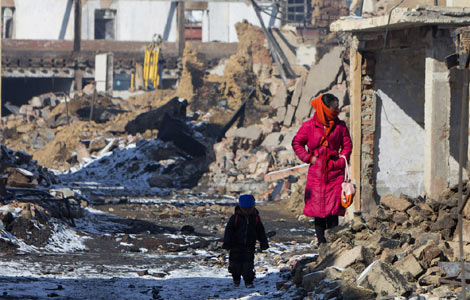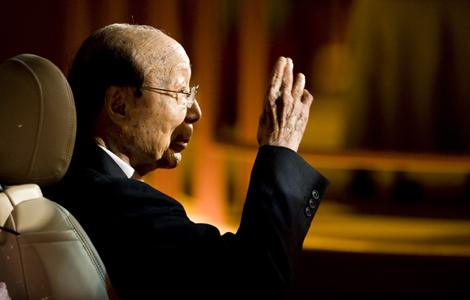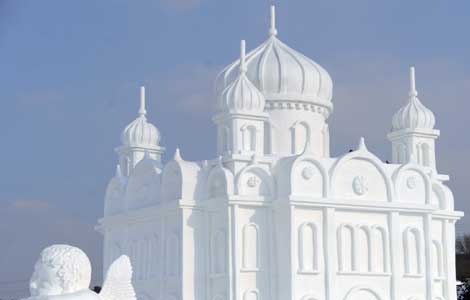Sisi in focus as Egyptians vote on constitution
Updated: 2014-01-15 11:43
(Agencies)
|
|||||||||||
FAILED EXPERIMENT
Sisi ousted Mursi, Egypt's first freely-elected head of state, last July. His Islamist opponents say he is the mastermind of a coup that kindled the worst internal strife in Egypt's modern history and revived an oppressive police state.
But after a failed experiment with democracy, many are weary of the upheaval that has gripped this nation of 85 million and shattered its economy. They see Sisi, 59, as someone who can stabilise and protect Egypt from what local media depict as foreign and domestic conspiracies to divide the nation.
Sisi inspected a polling station after voting began, dressed in desert-coloured fatigues and wearing his trademark dark sunglasses. The two-day vote ends on Wednesday.
A Sisi presidency would mark a return to the days when the post was controlled by army men - a pattern broken by Mursi's year in office.
Brotherhood supporters staged protests in at least four cities. Police arrested 65 Brotherhood supporters who were trying to obstruct voting, security officials said.
The bloodiest clashes were in Sohag, south of Cairo, and in Giza on the outskirts of the capital, the health ministry said in an emailed statement.
Local officials, speaking on condition of anonymity, said four Brotherhood supporters were killed in Sohag and more than 20 wounded, in addition to three policemen.
But the Interior Ministry said Brotherhood supporters had killed four people and wounded nine more, including a police officer, when they opened fire on passers-by to stop them reaching polling stations, the state news agency reported.
Four people were also killed in clashes in Giza, two of whom were shot dead in the village of Kerdasa, a bastion of Islamist support. Security sources identified them as Brotherhood supporters.
A man was also killed in Beni Suef, south of Cairo.
The International Commission of Jurists (ICJ), a Geneva-based group that works to uphold the rule of law, described the draft constitution as highly flawed.
"The referendum campaign has taken place within a context of fear, intimidation and repression, calling into question the fairness of the entire process," it said in a statement.
The government has recently escalated its crackdown on the Brotherhood, declaring it a "terrorist organisation" on December 25. Al Qaeda-inspired militants have stepped up attacks on security forces since Mursi's ouster.
While the government has linked the attacks to the Brotherhood, the group has repeatedly said it is a non-violent movement committed to peaceful resistance to the state.
But the security clampdown - hundreds of Islamists have been killed and thousands arrested - has taken the steam out of protests while fuelling anger among young Islamists. Mursi and other Brotherhood leaders have been arrested and are on trial.
Underlining how the political picture has changed since Mursi's downfall, Mubarak asked for permission to vote in this referendum, his lawyer Fareed El Deeb said. It was not immediately clear whether Mubarak - who faces retrial for his role in the killing of protesters in 2011 - would get to vote.
While Western states have criticised the crackdown and called for inclusive politics, they have put little pressure on Cairo. Egypt, which controls the Suez Canal, has been a cornerstone of U.S. policy in the Middle East since the 1970s, when it became the first Arab state to make peace with Israel.
The government has been supported by Gulf Arab states hostile to the Brotherhood. They jumped to Egypt's rescue after Mursi's overthrow, offering billions of dollars in aid.
The US Congress' new spending bill would restore more than $1.5 billion in military and economic aid to Egypt, largely cut off after Mursi's ouster, but would make the funding conditional on Egypt taking steps toward restoring democracy.
Related Stories
Egypt's leaders hope for stamp of legitimacy from referendum 2014-01-13 08:03
Egypt's General Sisi signals may run for president 2014-01-12 12:08
Egypt's Morsi in court for 2nd time over violence charges 2014-01-08 16:28
Egypt wants AU membership restored: FM 2014-01-07 10:56
Egypt summons Iran's charge d'affaires 2014-01-07 09:02
Today's Top News
UK moves away from Huawei products
At least 16 dead in E China factory fire
Hollande responds to affairs reports
Li offers Bulgaria help with big projects
Xi calls for reform to fight graft
China, Italy agree to boost co-op
S. China Sea rules no threat to peace
Park urges Japan to face history
Hot Topics
Lunar probe , China growth forecasts, Emission rules get tougher, China seen through 'colored lens', International board,
Editor's Picks

|

|

|

|

|

|





